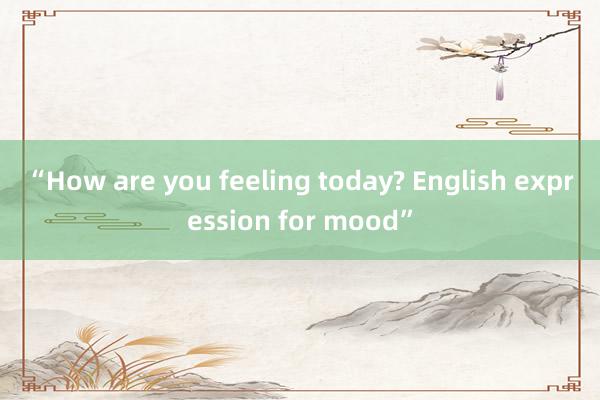时间:2025-03-25 09:36

**How Are You Feeling Today? English Expression for Mood**
The phrase "How are you feeling today?" is a common and polite way to inquire about someone's emotional or physical state in English-speaking cultures. It serves as a gateway to understanding not only the immediate mood of an individual but also their overall well-being. This simple question opens up opportunities for deeper conversations, helping people connect on a more personal level.
In English, there are numerous expressions used to describe one’s mood, each conveying a unique nuance of emotion. For instance, if someone feels particularly good, they might say they're "on top of the world" or "feeling like a million bucks." These phrases emphasize elation and confidence, making them ideal responses when life seems to be going exceptionally well. Conversely, if someone is down, they may admit to feeling "under the weather," which suggests mild sadness or fatigue,句容市菌芝园农业生物科技有限公司 or even confess to being "blue" or "down in the dumps, 江建教育" indicating a deeper sense of melancholy.
Mood can fluctuate throughout the day due to various factors such as stress, 临朐县名兰烘干设备厂 excitement, or even the weather. A person experiencing high levels of anxiety might describe themselves as "wired" or "antsy," while someone who has just received wonderful news could express that they’re "walking on air." These vivid metaphors paint pictures with words,曲周房产信息网-曲周房产网-曲周二手房 allowing individuals to communicate complex feelings succinctly.
木鱼联盟When asked how they feel, people often use humor to mask discomfort or awkwardness. Phrases like "I’m fine, thanks for asking" or "Could be worse!" reflect resilience and a positive outlook despite potential challenges. On the other hand, honesty is equally valued; admitting to feeling "stressed out," "exhausted," or "overwhelmed" invites empathy and support from others.
Understanding these expressions enriches communication by providing insight into human emotions. They highlight the richness of language in expressing abstract concepts like mood, showcasing how diverse and nuanced our feelings can be. Whether it’s joy, sorrow, frustration, or contentment, the ability to articulate one’s emotional state fosters mutual understanding and strengthens interpersonal bonds.
So next time you ask, "How are you feeling today?" take note of the colorful responses you receive. Each answer tells its own story, revealing layers of personality and experience beneath the surface. By embracing this linguistic diversity曲周房产信息网-曲周房产网-曲周二手房, we gain a greater appreciation for the complexity of human emotions—and perhaps learn something new about ourselves along the way.